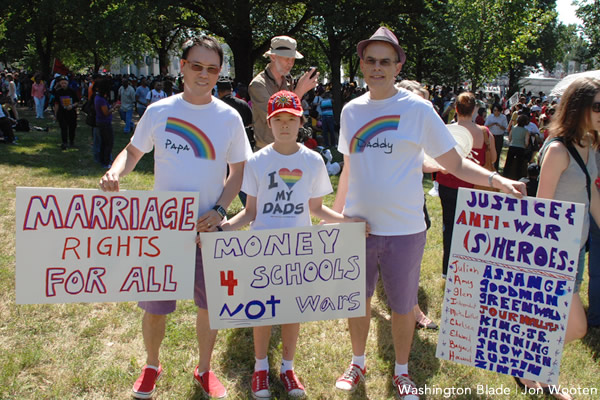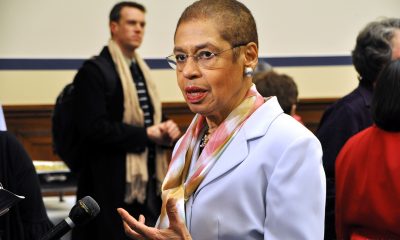National
LGBT March on Washington participants celebrate King legacy
Those who took part said civil rights leader would have backed gay rights
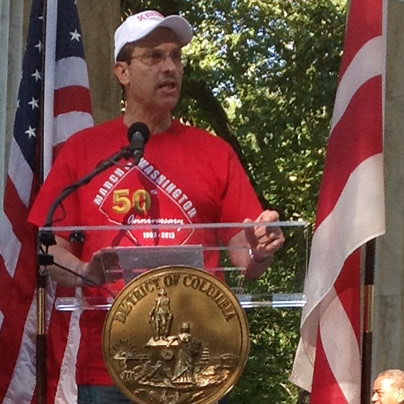
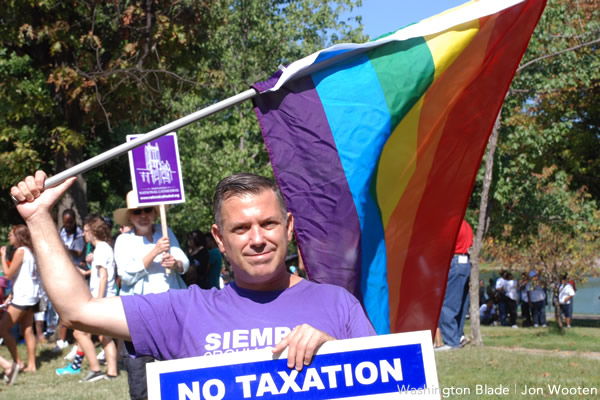
José Gutierrez, founder of the Latino GLBT History Project, at the National March on Washington (Washington Blade photo by Jon Wooten)
Liz Abzug, daughter of the late-former New York Congresswoman Bella Abzug who introduced the first federal gay rights bill in 1975, was 11-years-old when she and her mother attended the March on Washington in 1963.
She told the Washington Blade on Saturday her mother would have certainly returned to the Lincoln Memorial five decades later.
“She’d be up there speaking in the front,” Liz Abzug said as she stood with members of Congregation Beit Simchat Torah, an LGBT synagogue in New York City, on the National Mall. “She’d be screaming and speaking and charging up and thrilled, but saying we have unfinished business.”
Liz Abzug is among the LGBT rights advocates who joined the tens of thousands of people who commemorated the 1963 march during which Martin Luther King, Jr., delivered his famous “I Have a Dream” speech.
American Federation of Teachers President Randi Weingarten; National Black Justice Coalition Executive Director Sharon Lettman-Hicks, Rev. MacArthur Flournoy of the Human Rights Campaign; Service Employees International Union President Mary Kay Henry and Adrian Shanker, president of Equality Pennsylvania, are among those who joined Rev. Al Sharpton, NAACP President Benjamin Jealous and others at the Lincoln Memorial. New York City Council Speaker Christine Quinn and members of the National Gay and Lesbian Task Force, Equality Maryland, the Gay and Lesbian Community Center of Baltimore, the Latino GLBT History Project and other LGBT groups also took part.
“I’m here with my brothers and sisters, not only in the union movement, but with LGBT people, with African Americans from the civil rights movement,” Suzanne Keller of Richmond, Va., told the Blade as she stood along the reflecting pool in front of the Lincoln Memorial with her girlfriend who was 13-years-old when she watched the 1963 March on Washington on television. “I know I’m here with my people.”
Lance Chen-Hayes of Princeton, N.J., held a sign in support of marriage rights for same-sex couples and affordable health care as he stood on the Mall with his husband, Stuart Chen-Hayes, and their son Kalani. Stuart Chen-Hayes cited a list of people whom he considers heroes that include Bayard Rustin, who organized the 1963 March on Washington, and former U.S. Army private Chelsea Manning whom a military judge on Wednesday sentenced to 35 years in prison for leaking classified documents to Wikileaks.
“If we don’t stand up, speak up and be in the streets, who will,” Stuart Chen-Hayes told the Blade. “It’s especially important for us who are lesbian, gay, transgender and parents because there’s all sorts of folks who fought for us 50 years ago and long before that. It’s just continuing the struggle for civil rights and human rights.”
Anders Minter, a gay man who is a member of the United Auto Workers, traveled to the nation’s capital from Amherst, Mass. to attend the march.
He told the Blade he felt “incredible power and solidarity” while marching, but noted what he described as a “great tension.”
“It’s been 50 years since we’ve come together as a country with a focus on economic justice and social justice,” Minter said, noting the commemoration of the 1963 March on Washington took place against the backdrop of June’s U.S. Supreme Court decision that struck down a crucial portion of the Voting Rights Act and last month’s acquittal of George Zimmerman in the 2012 shooting death of Florida teenager Trayvon Martin. “It’s been a long journey, but there’s a long journey ahead.”
D.C. officials used the march to highlight the issue of statehood for the nation’s capital.
D.C. Mayor Vincent Gray noted during a pro-statehood rally at the D.C. War Memorial near the Mall that people of “different sexual orientations and genders” were among those who attended the 1963 March on Washington.
“We’re demanding justice because justice is exactly what we are here to accomplish,” he said.
D.C. Council Chair Phil Mendelson (D-At-Large,) D.C. Council members Jack Evans (D-Ward 2,) Muriel Bowser (D-Ward 4,) Marion Barry (D-Ward 8,) Vincent Orange (D-At-Large,) Anita Bonds (D-At-Large) and David Grosso (I-At-Large) and D.C. Police Chief Cathy Lanier are among those who also attended the pro-statehood rally.
Roland Martin, a former CNN commentator whom the network suspended in 2012 over homophobic tweets he sent during that year’s Super Bowl, also spoke.
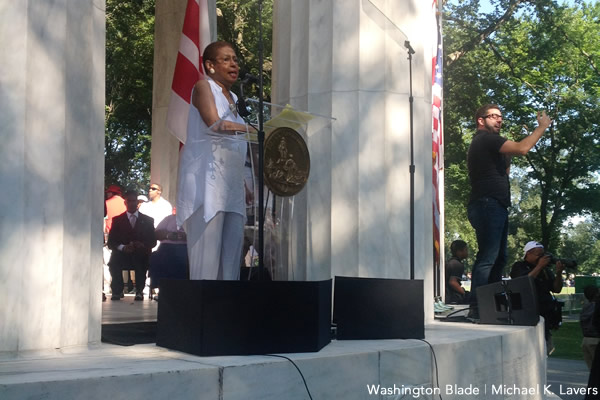
D.C. Congressional Del. Eleanor Holmes Norton speaks at a pro-D.C. statehood rally at the D.C. War Memorial on Aug. 24, 2013. (Washington Blade photo by Michael K. Lavers)
“This morning we serve notice as the March on Washington 2013 begins that we, who have fewer rights than almost any who will march today, can no longer allow the deliberate disempowerment and denial of our rights to go unnoticed, unnoted, unmentioned and ignored,” D.C. Congressional Del. Eleanor Holmes Norton, who helped to organize the 1963 March on Washington, said. “No more marches and ignoring D.C.”
King understood rights are ‘not divisible’
Many of the march participants with whom the Blade spoke said they feel King would have supported LGBT rights if he were still alive.
“His message of equality, his message of inclusion of all people was loud and clear in everything that he wrote and every speech that he gave,” Grosso said.
“We’re humans and everybody deserves the same rights,” Daniel Trejo of Columbia Heights told the Blade as he prepared to march to the Lincoln Memorial with the D.C. Office on Latino Affairs.
Minter referenced King’s “I Have a Dream” speech as he discussed how he feels the slain civil rights leader would have backed LGBT rights.
“Martin Luther King was an incredible listener, as much as he was an incredible orator,” Minter said. “Part of acceptance and love is listening and understanding and I think he would have added this to his work.”
Both Liz Abzug and Keller noted to the Blade the slain civil rights leader’s widow, Coretta Scott King, backed marriage rights for same-sex couples before she passed away in 2006.
“Dr. King had a key understanding that rights are not divisible,” Keller said. “If we don’t have human rights for everybody, we don’t have human rights for anybody.”
U.S. Supreme Court
Supreme Court to consider bans on trans athletes in school sports
27 states have passed laws limiting participation in athletics programs

The U.S. Supreme Court on Thursday agreed to hear two cases involving transgender youth challenging bans prohibiting them from participating in school sports.
In Little v. Hecox, plaintiffs represented by the ACLU, Legal Voice, and the law firm Cooley are challenging Idaho’s 2020 ban, which requires sex testing to adjudicate questions of an athlete’s eligibility.
The 9th U.S. Circuit Court of Appeals described the process in a 2023 decision halting the policy’s enforcement pending an outcome in the litigation. The “sex dispute verification process, whereby any individual can ‘dispute’ the sex of any female student athlete in the state of Idaho,” the court wrote, would “require her to undergo intrusive medical procedures to verify her sex, including gynecological exams.”
In West Virginia v. B.P.J., Lambda Legal, the ACLU, the ACLU of West Virginia, and Cooley are representing a trans middle school student challenging the Mountain State’s 2021 ban on trans athletes.
The plaintiff was participating in cross country when the law was passed, taking puberty blockers that would have significantly reduced the chances that she could have a physiological advantage over cisgender peers.
“Like any other educational program, school athletic programs should be accessible for everyone regardless of their sex or transgender status,” said Joshua Block, senior counsel for the ACLU’s LGBTQ and HIV Project. “Trans kids play sports for the same reasons their peers do — to learn perseverance, dedication, teamwork, and to simply have fun with their friends,” Block said.
He added, “Categorically excluding kids from school sports just because they are transgender will only make our schools less safe and more hurtful places for all youth. We believe the lower courts were right to block these discriminatory laws, and we will continue to defend the freedom of all kids to play.”
“Our client just wants to play sports with her friends and peers,” said Lambda Legal Senior Counsel Tara Borelli. “Everyone understands the value of participating in team athletics, for fitness, leadership, socialization, and myriad other benefits.”
Borelli continued, “The U.S. Court of Appeals for the Fourth Circuit last April issued a thoughtful and thorough ruling allowing B.P.J. to continue participating in track events. That well-reasoned decision should stand the test of time, and we stand ready to defend it.”
Shortly after taking control of both legislative chambers, Republican members of Congress tried — unsuccessfully — to pass a national ban like those now enforced in 27 states since 2020.
Federal Government
UPenn erases Lia Thomas’s records as part of settlement with White House
University agreed to ban trans women from women’s sports teams

In a settlement with the Trump-Vance administration announced on Tuesday, the University of Pennsylvania will ban transgender athletes from competing and erase swimming records set by transgender former student Lia Thomas.
The U.S. Department of Education’s Office for Civil Rights found the university in violation of Title IX, the federal rights law barring sex based discrimination in educational institutions, by “permitting males to compete in women’s intercollegiate athletics and to occupy women-only intimate facilities.”
The statement issued by University of Pennsylvania President J. Larry Jameson highlighted how the law’s interpretation was changed substantially under President Donald Trump’s second term.
“The Department of Education OCR investigated the participation of one transgender athlete on the women’s swimming team three years ago, during the 2021-2022 swim season,” he wrote. “At that time, Penn was in compliance with NCAA eligibility rules and Title IX as then interpreted.”
Jameson continued, “Penn has always followed — and continues to follow — Title IX and the applicable policy of the NCAA regarding transgender athletes. NCAA eligibility rules changed in February 2025 with Executive Orders 14168 and 14201 and Penn will continue to adhere to these new rules.”
Writing that “we acknowledge that some student-athletes were disadvantaged by these rules” in place while Thomas was allowed to compete, the university president added, “We recognize this and will apologize to those who experienced a competitive disadvantage or experienced anxiety because of the policies in effect at the time.”
“Today’s resolution agreement with UPenn is yet another example of the Trump effect in action,” Education Secretary Linda McMahon said in a statement. “Thanks to the leadership of President Trump, UPenn has agreed both to apologize for its past Title IX violations and to ensure that women’s sports are protected at the university for future generations of female athletes.”
Under former President Joe Biden, the department’s Office of Civil Rights sought to protect against anti-LGBTQ discrimination in education, bringing investigations and enforcement actions in cases where school officials might, for example, require trans students to use restrooms and facilities consistent with their birth sex or fail to respond to peer harassment over their gender identity.
Much of the legal reasoning behind the Biden-Harris administration’s positions extended from the 2020 U.S. Supreme Court case Bostock v. Clayton County, which found that sex-based discrimination includes that which is based on sexual orientation or gender identity under Title VII rules covering employment practices.
The Trump-Vance administration last week put the state of California on notice that its trans athlete policies were, or once were, in violation of Title IX, which comes amid the ongoing battle with Maine over the same issue.
New York
Two teens shot steps from Stonewall Inn after NYC Pride parade
One of the victims remains in critical condition

On Sunday night, following the annual NYC Pride March, two girls were shot in Sheridan Square, feet away from the historic Stonewall Inn.
According to an NYPD report, the two girls, aged 16 and 17, were shot around 10:15 p.m. as Pride festivities began to wind down. The 16-year-old was struck in the head and, according to police sources, is said to be in critical condition, while the 17-year-old was said to be in stable condition.
The Washington Blade confirmed with the NYPD the details from the police reports and learned no arrests had been made as of noon Monday.
The shooting took place in the Greenwich Village neighborhood of Manhattan, mere feet away from the most famous gay bar in the city — if not the world — the Stonewall Inn. Earlier that day, hundreds of thousands of people marched down Christopher Street to celebrate 55 years of LGBTQ people standing up for their rights.
In June 1969, after police raided the Stonewall Inn, members of the LGBTQ community pushed back, sparking what became known as the Stonewall riots. Over the course of two days, LGBTQ New Yorkers protested the discriminatory policing of queer spaces across the city and mobilized to speak out — and throw bottles if need be — at officers attempting to suppress their existence.
The following year, LGBTQ people returned to the Stonewall Inn and marched through the same streets where queer New Yorkers had been arrested, marking the first “Gay Pride March” in history and declaring that LGBTQ people were not going anywhere.
New York State Assemblywoman Deborah Glick, whose district includes Greenwich Village, took to social media to comment on the shooting.
“After decades of peaceful Pride celebrations — this year gun fire and two people shot near the Stonewall Inn is a reminder that gun violence is everywhere,” the lesbian lawmaker said on X. “Guns are a problem despite the NRA BS.”
-

 U.S. Supreme Court3 days ago
U.S. Supreme Court3 days agoSupreme Court to consider bans on trans athletes in school sports
-

 Out & About3 days ago
Out & About3 days agoCelebrate the Fourth of July the gay way!
-

 Virginia3 days ago
Virginia3 days agoVa. court allows conversion therapy despite law banning it
-

 Opinions4 days ago
Opinions4 days agoCan we still celebrate Fourth of July this year?

